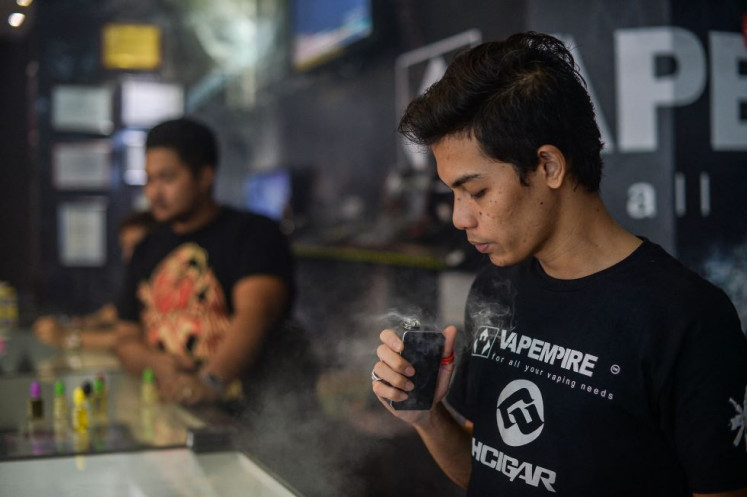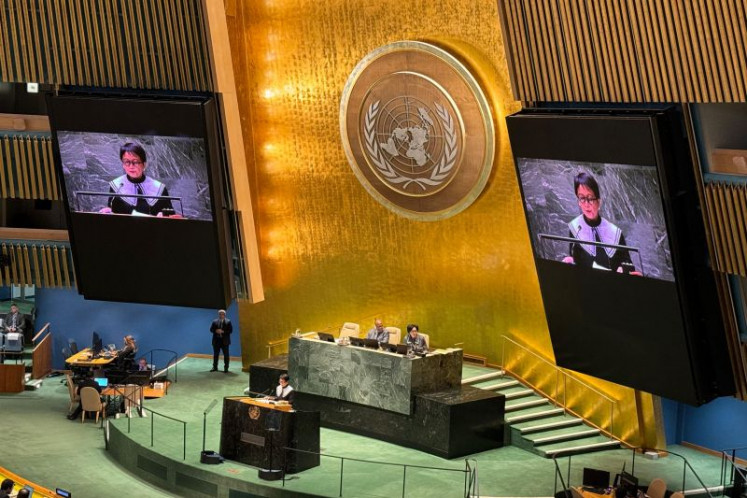Empowering ASEAN youth
Being significantly less competitive than its regional cohorts will spell great dangers if Indonesia does not remedy these issues.
Change Size
 A young person walks through a tunnel near Jl. Kendal during afterwork hours in Jakarta on July 11, 2023. A survey in 2022 showed that young people, specifically Gen Zs, in Indonesia experience the most mental health problems, with over 59 percent out of 1,870 respondents. (Antara/Rivan Awal Lingga)
A young person walks through a tunnel near Jl. Kendal during afterwork hours in Jakarta on July 11, 2023. A survey in 2022 showed that young people, specifically Gen Zs, in Indonesia experience the most mental health problems, with over 59 percent out of 1,870 respondents. (Antara/Rivan Awal Lingga)
A
t the Democracy Dialogue held by The Jakarta Post as part of its 40th anniversary celebrations, one of the panelists made a very sobering observation about how in Indonesia, the burgeoning middle-class, and inevitably the youth that makes up a sizeable portion of it, should not be mistaken for a reliable engine of democracy.
This conclusion was made in response to a question from the audience on whether it is worth it for Indonesia to strive for a more substantive democracy, at a time when “the minimalist version” is already serving its purpose.
The backdrop to this question was likely informed by the topics that were raised throughout the day, whether it is the insidious role of Big Tech in modifying our behaviors (doom scrolling and superficial flaunting on social media come to mind), the role of the economy in a democracy, or how Southeast Asia is so diverse that you can have a thriving democracy in one corner and a junta in another.
All of these issues were raised in service of asking the question: Is democracy sustainable in Southeast Asia?
As with any question that touches on sustainability, the perspective of the youth (aka the future) should be a central component in the discussion of democratic resilience. So there is arguably some danger in suggesting that democracy should perhaps not be left to the young.
In a rapidly evolving global landscape, Southeast Asia stands at the crossroads of progress, striving to shape its destiny as an economic, political and cultural powerhouse. One might argue that as the world hurtles forward in the digital age, empowering the next generation with quality education and employment opportunities might become an essential catalyst for regional growth and prosperity.
Why education and employment? A competitive youth demographic holds profound implications beyond its economic impact, extending to the very heart of societal cohesion, stability and the democratic fabric of Southeast Asian nations.
The significance of empowering young people with pathways to upward mobility and meaningful employment cannot be overstated, some experts say, as it serves as a crucial countermeasure against the potentially destabilizing forces of social unrest and disenchantment.
At the heart of this concept lies the recognition that a lack of opportunities for youth can fuel frustration, disillusionment and a sense of disconnection from the broader social framework.
It could be the difference between Indonesia’s young middle class, who seemingly enable the erosion of civil liberties in favor of a “performative” democracy, and that of Myanmar or even Thailand, who have backed the push for great upheaval, sometimes at the risk of losing their lives.
According to the 2022 ASEAN Youth Development Index, Indonesia scored 0.544 in the education category, lower than the regional average of 0.56. In the youth development category, Indonesia scored 0.437, lower than the regional average of 0.54.
Being significantly less competitive than its regional cohorts will spell great dangers if Indonesia does not remedy these issues, experts and officials have argued.
Conversely, when young people are equipped with the tools to succeed, they are less likely to fall prey to extremist ideologies or engage in acts of violence driven by frustration and despair. Instead, they become agents of positive change, capable of channeling their energies into constructive pursuits that contribute to the overall betterment of society.
An empowered youth is also more likely to engage in the democratic process, leveraging education and experiences to make informed choices and hold their leaders accountable.
As these young individuals rise through the ranks of leadership and influence, they bring fresh perspectives, innovative ideas and a deep understanding of the challenges facing their societies. This diversity of thought enriches policy discussions and decision-making processes, leading to more comprehensive and effective solutions to complex issues.
The time to invest in the future is now, for in the hands of the youth lies the destiny of the region.









